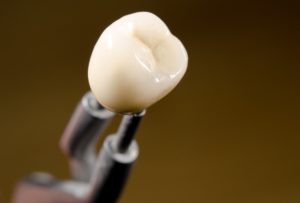 A single dental crown is the most commonly used restorative treatment because of its versatility to protect a weakened tooth or repair significant damage. Crowns can also be used along with other treatments, like root canal therapy. No matter the reason, it provides a long-term solution to improve your smile: however, it won’t last forever. Many things affect the lifespan of a crown, but here’s how you can get the most out of your restoration.
A single dental crown is the most commonly used restorative treatment because of its versatility to protect a weakened tooth or repair significant damage. Crowns can also be used along with other treatments, like root canal therapy. No matter the reason, it provides a long-term solution to improve your smile: however, it won’t last forever. Many things affect the lifespan of a crown, but here’s how you can get the most out of your restoration.
Life Expectancy of Dental Crowns
A crown is a customized cap that’s bonded over the entire surface of a tooth above the gum line. The average life expectancy is about 10 years, but it’s not unusual for them to last for much longer. Many factors will influence how long your crown will last, including:
- Materials: Metal crowns can have a slightly longer lifespan than those made of porcelain or ceramic.
- Location: Back teeth experience more pressure than those in the front. Crowns placed on molars can experience more wear and tear, so they may need to be replaced sooner than restorations bonded to front teeth.
- Oral Hygiene: Brushing, flossing, and using a daily mouthwash will keep harmful oral bacteria under control.
- Diet: A healthy diet will safeguard your crown and natural teeth. Limit your consumption of sugary foods and drinks. Avoid hard or chewy foods, which can damage your crown. It’s also best to limit alcohol because it can weaken the bonding material holding your crown to your tooth.
- Oral Habits: Using your teeth in place of scissors or tools can damage your restoration. It’s also a good idea to keep inedible objects out of your mouth, including your fingernails.
- Bruxism: Grinding and clenching your teeth will cause you to need a replacement sooner. A nightguard will provide a cushion between the upper and lower teeth to protect your crown.
- Regular Dental Care: Semi-annual cleanings and checkups allow your dentist to monitor your oral health to detect anything concerning while it is still small. They’ll check your restoration at each appointment to ensure it’s undamaged and functioning as intended.
Your crown can serve you for a decade or longer by giving your smile the attention it deserves.
Signs of Dental Crown Failure
No matter how well you care for your crown, there will come a time when it will need to be replaced. It’s important to contact your dentist at the first sign of a complication, like visible damage, pain, or a receding gum line. If you develop any symptoms of dental crown failure, contact your dentist right away to prevent a small issue from turning into a big problem.
About Dr. Shauna Soltani
Dr. Soltani earned her dental degree at the University of Colorado School of Dental Medicine and has continued her education in many specialties, like cosmetic dentistry, root canal therapy, and TMJ treatment. She combines the art and science of dentistry to create healthy, beautiful smiles. If you need a dental crown, contact our office through our website or call us at (702) 794-9941.



